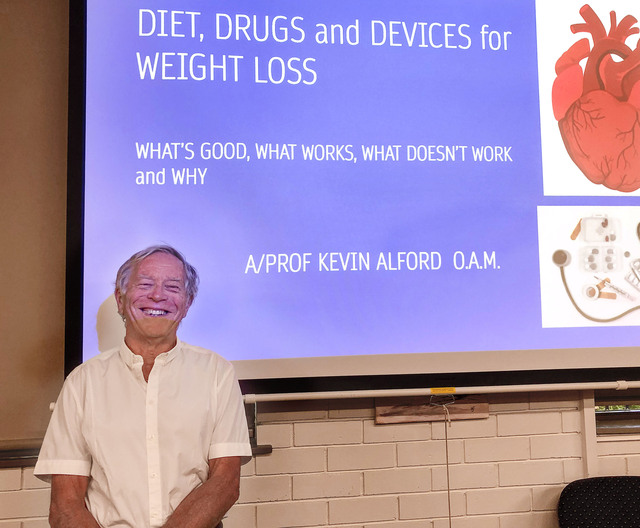During his long career working as a cardiologist in South Africa, England and Australia Associate Professor Kevin Alford’s recommendation for weight loss was diet and exercise, regarding most diet drugs as having been “pretty useless” but recently developed GLP-like drugs such as Ozempic have been game changers.
During a talk at Noosa U3A last month Dr Alford spoke about the increase in weight gain and obesity in western society since the 1960s, its causes, its impacts and the use of diet drugs such as Ozempic.
“It’s only when we have an excess of energy stores available to us that the proverbial hits the fan,” he said.
“The proverbial started to hit the fan around 1960.
“According to the WHO a tipping point occurred around 1960.
“Major changes have occurred in our food and our lifestyle and we’re now perpetuating this.
“Around 2000 the WHO declared obesity a world epidemic.
“We live in what we call an obesogenic environment. We evolved from hunter-gathering. Then all of a sudden we’ve got a hell of a lot of food excess. We don’t have any famines in western society. There’s this huge decrease in exercise. This is the behaviour, the environment that generates obesity.
“It’s important to know the human body wants to store fat in times of famine. It keeps recalibrating our baseline.”
Other influences on obesity include chronic stress, genetics, gut microbiome, physical activity, diet, toxins and sleep deprivation, he said.
“About 15 years ago a new word came into medicine – dia-besity – a combination of diabetes and obesity and the health risks are enormous. Once this occurs we develop heart disease, vascular disease, high blood pressure, osteoarthritis, sleep apnea, diabetes, stroke.”
Dr Alford said it was critical for the body to maintain steady glucose levels, as our brain needs steady glucose levels to function.
“Insulin allows glucose, which is a critical component of our energy system, to get into the cell and do what it needs to do,” he said.
“Type I diabetes is due to a deficiency in insulin, so you can’t get the glucose into the cell.”
In type 2 diabetes, the body doesn’t make enough insulin or doesn’t use insulin well, resulting in too much glucose staying in the blood, and not enough reaching the cells.
For people with diabetes type 2, Ozempic works to lower blood glucose levels by telling your body to produce more insulin when you eat. It also slows the motion and absorption of food from your gut and reduces your appetite.
“We became very interested in some of these diabetic drugs that worked by increasing this substance – (glycogen-like peptide) GLP1,” Dr Alford said.
“When the drugs first came out I thought they were too good to be true.
“Ozempic was used for diabetes early on, then people found they were losing weight.”
Studies have since found the drug, which was developed from the venom of a Gila monster, a South American venomous lizard, has further benefits than weight loss.
“They found people who were given this substance GLP, their arteries opened a bit better, their plaque stabilised, their blood flow improved, platelets improved,” he said.
“We found it’s major action is on the brain. It stops craving for food. It acts on the stomach. You feel full, your stomach doesn’t empty as quickly.”
Dr Alford said using Ozempic guarantees you to lose weight with a minimum weight loss of 12-23 per cent, and it also has beneficial affects on many organs.
It acts on the brain to decrease appetite, it has actions where it makes the brain better, it’s being used in Parkinsons and Alzheimers trials. In the liver it decreases fatty liver, it improves muscle function, improves pancreatic function, increases breakdown of fat, increases muscle pumping. It’s been recommended in certain forms of heart failure. It improves endothelial function, improves the lining of walls of blood vessels, he said.
A large trial was done with people who were overweight but not diabetic. It found weight decreased and there was a 20 per cent decrease in cardio-vascular events over the next 5-10 years, he said.
Initially drugs like Ozempic were very expensive and restricted to diabetic use but they are becoming more available and affordable for people who are just overweight.
Dr Alford said an issue to consider is the sustainability of weight loss.
There are other things that cause people to become overweight such as emotional issues, comfort eating. This might not help that long term, he said.
“To sustain weight loss you have to address all the factors that affect the individual,” he said.
“Take the drugs but if don’t change your lifestyle, it might not work long term.”








